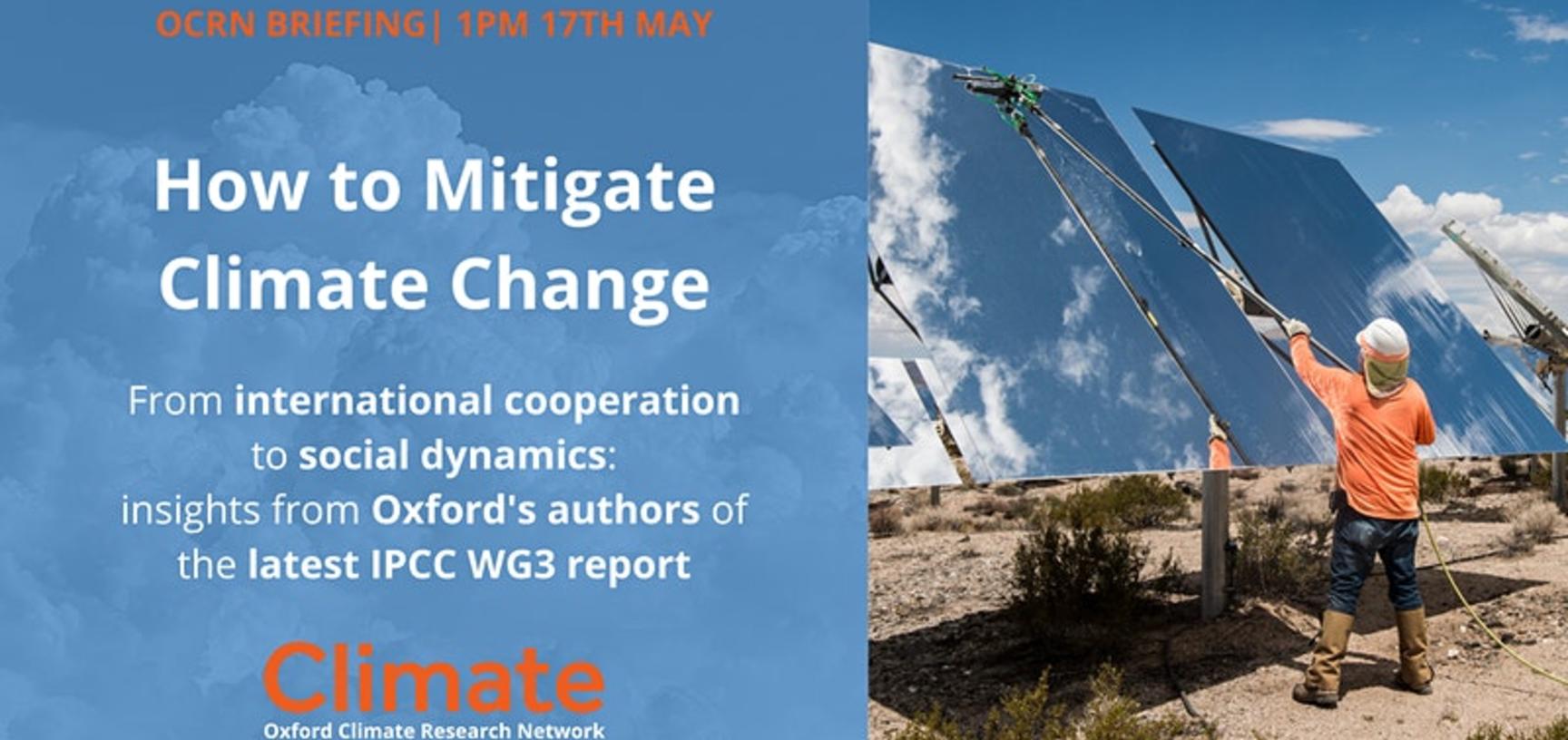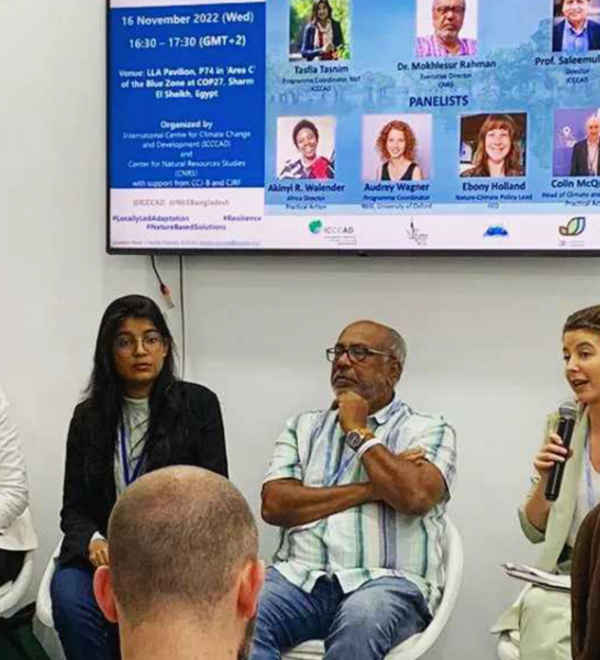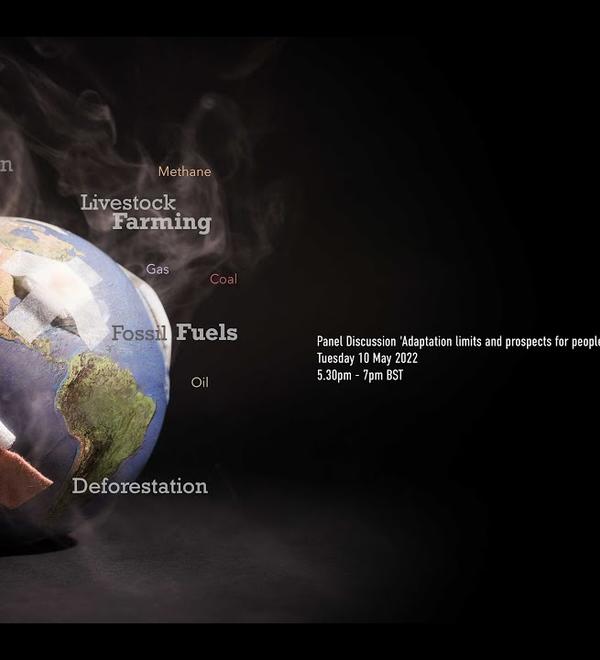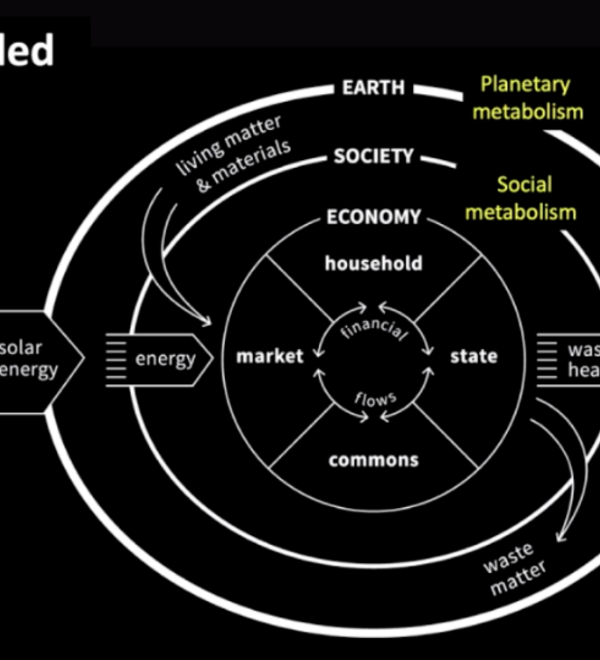From international cooperation to social dynamics: insights from Oxford's authors of the latest IPCC AR6 WGIII report
“We are at a crossroads. The decisions we make now can secure a liveable future. We have the tools and know-how required to limit warming” - Hoesung Lee (IPCC Chair)
Blog by Katie Lois Hutchinson
The Working Group III (WGIII) section of the Sixth Assessment Report (AR6) from the Intergovernmental Panel on Climate Change, titled ‘Climate Change 2022: Mitigation of Climate Change’ was released on 4th April 2022 (following the publication of the WGII contribution, released on 28th February 2022).
Involving over 275 authors, 59000 review comments and 18000 citations (IPCC, 2022), the report provides an updated global assessment of climate change mitigation progress and pledges, and examines the primary sources of global emissions. It also explores the role that mitigation will play in helping us slow climate change.
More specifically, the report explores and unpicks the following questions:
- How evidence has shifted since the previous IPCC report (in relation to limiting warming to 1.5°C)?
- How close are we from the long-term goals of the Paris Agreement?
- How are the outcomes from COP26 shaping up?
- What are the strongest options for climate-compatible development?
- How might this latest IPCC report influence or accelerate transitions?
Furthermore, the WGIII report details the cruciality of sustainable development whilst assessing its wider risks and co-benefits. Whilst looking into emissions and mitigation efforts since 2000, the report explores national and long term goals, and it links these with never-included-before chapters on technological innovations in relation to mitigation, and on the social aspects and implications of mitigation.
The report also explores risks and synergies that may present themselves in relation to energy, agriculture, land use, settlements, buildings, transport, and industry. The report is trans-disciplinary, engaging multiple sectors and technological advancements and the report also highlights the ways in which we, as a society, need to adapt institutions, policies, international cooperation, finance, and technological developments to strengthen mitigation efforts.
On 17th May 2022, the Oxford Climate Research Network (OCRN) hosted its third and final event upon the IPCC AR6 reports. The preceding events hosted by OCRN explored the WGI & II reports, which explored how and why the climate is changing, the impacts of climate change and what they mean for adaptation and resilience. The WGIII event, hosted in the nearly-new Levine Auditorium in Trinity College (and streamed live online (catch the recording of the event here)), focussed upon the working group 3 (WGIII) report, and the event followed a tea and coffee networking reception.
The event consisted of an expert panel of IPCC authors from Oxford and beyond, who addressed the above-mentioned questions, provided a short tour of their involvement with the report and discussed what they found distinctive about the findings. This panel gave unparalleled insight into the report, and bought about an opportunity to learn about the latest information that will form the foundation of climate developments over the coming years, directly from those involved in synthesising the state of the field.
The panellists at the event included:
- Charlie Wilson Professor of Energy and Climate Change at Environmental Change Institute
- Nick Eyre Professor within Environmental Change Institute, Director of UK Wide Centre for Research into Energy Demand Solutions, Acting Co-Director of Zero Carbon Energy Research Institute
- Navroz Dubash, Professor at Centre for Policy Research, Adjunct Senior Research Fellow at Lee Kuan Yew School of Public Policy
- Lavanya Rajamani, Professor of International Environmental Law, Yamani Fellow in Public International Law
Charlie Wilson (a contributing author to social aspects chapter in the report) kicked started the panel, with an introduction and a summary of the trends and near and long term mitigation pathways that we need to help us tackle climate change. Charlie begun by highlighting what has changed since the last report, stating that we can now see that:
“Mitigation is 4/5th an energy problem & 1/5 a land problem”
He followed by saying that we need to use less energy, decarbonise and mop up residual emissions that we can’t mitigate, either through technology or natural forms of removal. Charlie also explained that although 24 countries emissions have now peaked and are declining, this is being cancelled out by other countries emissions rising rapidly. On the whole though, the global rate of emission growth has slowed, and 90% of emissions are now covered by some form of net-zero pledge (with a huge increase in this leading up to COP26). However, although there is lots of activity, it is still too little compared to what’s needed, especially in relation to deforestation. Although deforestation has declined and net forest cover has generally increased, there has been a recent snapback in the Amazon rainforest, with deforestation sadly increasing again. Charlie wrapped up his talk with a stark statistic and a bold statement:
“There is an inequitably strong skew to emissions – the top 10% of households worldwide (based on income), account for ~45% global emissions, and we need absolute retirement of fossil fuel infrastructure for us to be anywhere near our 1.5 goal”
Nick Eyre (a review editor on the social aspects of mitigation chapter in the report) followed Charlie, with a short talk covering the importance of alterations within energy systems. Nick began with a hopeful statistic:
“There is potential to decrease emissions by up to 70% by 2050, but this will require systemic change across all of society (including bringing about changes to diet and travel, via increasing walking and cycling, all whilst reducing air travel)”
Nick then highlighted that energy is the main contributor to carbon emissions, but that the cost of wind and solar have decreased to a level that is competitive with fossil fuels. However, Nick pointed out that there are still 1 billion people on the planet without access to electricity and that we will not solve climate change whilst this inequity exists.
After Nick, Navroz Dubash (a co-ordinating lead author on the national and subnational policies and institutions chapter in the report) then spoke. He detailed how 53% of emissions are now covered by laws and legal frameworks, but that there is limited evidence on the effectiveness of these laws and policies. On the whole though, across all sectors in G20 countries, there has been an increase in policies, meaning that we’re trying and testing more things that may help the situation. Navroz also highlighted how at the sectoral level (appliance standards and building codes etc.), policies have been effective, but that we still need policies that are mixed and that tackle a wealth of problems (for example combining renewable generation with coal phaseout) but Navroz emphasised that the latter cannot be done in a way that will negatively impact mining communities and their wellbeing.
Lavanya Ragimani (a co-ordinating lead author on the international co-operation chapter in the report) finished the panel with a presentation upon the cruciality of international co-operation. Lavanya explained how we have moved away from seeing the international mitigation challenge as purely a global commons problem, and that we have moved towards one which includes socio-technical transitions and shifting development pathways. Lavanya also pointed out how international co-operation is a critical enabler for ambitious mitigation and that it is having positive, measurable outcomes. For example, the Kyoto protocol, which has led to measurable decreases in emissions, with 20 countries seeing a decade of absolute declining emissions. Lavanya also suggested that we need to strengthen international co-operation by creating more ambitious goals for bunker fuels and ensuring that trade, energy and investment agreements don’t hinder mitigation. One way to do this may be through strengthening and increasing support for nationally determined contributions (NDC’s), however Lavanya stated:
“Current levels of finance for NDC’s are 3-6 levels below what they need to be to reach below 2 degrees”
Lavanya finished her talk by explaining how some sectors (such as aviation and maritime) are lagging behind the 1.5 degree goal, and that there is often patchy coverage on radiation management and CO2 removal, which we will rely on for remaining below 1.5-2 degrees of warming.
An interactive Q&A session followed the panel, and discussions surrounded the importance of human rights integration with developments relating to mitigation, the importance of NDCs and the ‘rich landscape’ of institutions that help mitigate climate change. When asked if carbon and fossil fuel subsidies could be reduced in a politically feasible way, Navroz highlighted the importance of moving climate policies along whilst also shifting along climate politics. A question came up surrounding the usefulness of grassroots efforts, to which Nick stated that they can be most useful in relation to decreasing energy demand (insulation/public transport/diet change etc.). Additionally, questions arose surrounding the feasibility of travel electrification, and changes to travel, with Nick explaining the importance of IT improvements for virtual attendance to events, and better walking and cycling provisions.
During the Q&A, Navroz stated:
“We’ve had 20 years of thinking that the reason why countries won’t act on climate change is because their neighbours wont act on climate change”
Before explaining how literature states that we are:
“Prisoners of the wrong dilemma”
– meaning that climate change and lack of action is not a global commons problem, but instead, a problem of convincing national constituencies to push through policies because they are actually in their interest.
All of the findings from the AR6 report will lay the foundations for many reports to come, and contribute towards the global fight against climate change. The panel highlighted to all just how important mitigation and regimented policies are, and although individuals have a large part to play, we must call upon policy makers and institutions to develop regimented rules for mitigation.
So, what are the next steps? Well, we know that the AR4 & AR5 reports were incredibly accurate and so we can use AR6 to help us predict what the coming years will entail. The next IPCC report will be released around 2030, which will mark the end of the decade of ecosystem restoration and the year by which emissions should have decreased by 50%. This panel showed us that we have time to limit the impacts of climate change, and that limiting warming to 2 degrees is possible with rapid mitigation efforts, but we need to act quickly and collectively as one.
References:
IPCC. (2022). Sixth Assessment Report Fact Sheet. Available: https://www.ipcc.ch/site/assets/uploads/2022/04/AR6_Factsheet_April_2022.... Last accessed 18th May 2022.










